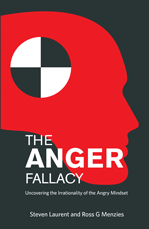Bookstore
Home »
Bookstore » The Anger Fallacy Workbook: Practical Exercises for Overcoming Irritation, Frustration and Anger
The Anger Fallacy Workbook: Practical Exercises for Overcoming Irritation, Frustration and Anger
Ross G Menzies and Steven Laurent
Based on their ground-breaking book The Anger Fallacy, leading psychologists Ross Menzies and Steven Laurent have put together 35 simple, practical exercises to help rid your life of anger. In this workbook you will learn to:
- find humour or gratitude in annoying situations
- develop a more enlightened attitude to how people ‘should’ behave
- ditch the bad habit of singling out one person to blame
- discover the key to patience
- and much, much more…
Using this workbook, either on your own or with a therapist, you can practice the anger management concepts from The Anger Fallacy, and learn to master anger, the most toxic of emotions.
Reader
praise for The Anger Fallacy:
"As a
clinical psychologist, I can honestly say this is the finest book on anger I
have ever explored.”
"This is
such a good book — I have started recommending it to anyone who is struggling
with being angry. It is easy to read, non-judgmental, and helpful.”
"A
potentially life-changing book, reading this really challenged some ideas I had
about anger, and human emotion in general.”
READ THE BESTSELLING BOOK --
About the Author
Associate Professor Ross G. Menzies has been providing cognitive–behaviour therapy for anxiety, depression, anger, couples conflict and related issues for over two decades. He completed a B.Sc (Psych), M.Psychol (Clin), and a PhD in clinical psychology at the University of New South Wales in Sydney, Australia. He is currently Associate Professor in Health Sciences at the University of Sydney. He is the past New South Wales’ president, and twice national president, of the Australian Association for Cognitive Behaviour Therapy (AACBT). He is the long-standing editor of Australia’s national CBT scientific journal, Behaviour Change. He has recently been appointed the convenor and president of the 8th World Congress of Behavioural and Cognitive Therapies to be held in Australia in 2016. Associate Professor Menzies is an active researcher and currently holds over $5 million in national competitive research grants. He has produced 5 books, over 150 international journal manuscripts and book chapters and is regularly invited to speak at conferences and leading universities and institutions around the world. He continues to attract patients from across metropolitan Sydney, rural New South Wales, interstate and from overseas, with many individuals and families travelling thousands of kilometres to receive treatment at his private practice. The current book is his second major work on anger.
Steven Laurent is a clinical psychologist with extensive experience in treating the full range of psychiatric disorders. He is regular guest lecturer at the University of Sydney, where he has taught on anger-related disorders and states, mood disorders, anxiety disorders, and drug and alcohol disorders. Currently, he works in private practice in the inner west of Sydney. Laurent completed a masters in Clinical Psychology at the University of New South Wales, where his thesis centred on facial perception in ‘psychopaths’. Laurent’s interest in anger arose in the 1990s during the completion of undergraduate degrees in philosophy and formal logic at the Sorbonne in Paris.
Table of Contents
About the Authors
Acknowledgements
Preface
Exercise 1: Anger Monitoring
Exercise 2: Identifying ‘Shoulds’
Exercise 3: Finding Alternatives to ‘Shoulds’
Exercise 4: Recognising the Arbitrariness and Silliness of Anger
Exercise 5: Finding Humour
Exercise 6: Mea Culpa — Apologising for Your Anger
Exercise 7: Explaining the Origin of Your ‘Shoulds’
Exercise 8: Explaining the Origin of Someone Else’s ‘Shoulds’
Exercise 9: Cultivating Gratitude
Exercise 10: Overcoming the Need for Fairness
Exercise 11: What Went Well Today?
Exercise 12: Identifying the Costs of Your Anger
Exercise 13: Identifying How Anger Interferes With Problem-Solving
in Real Situations
Exercise 14: Nonuniversality of Ethics — Differences in law
Exercise 15: Nonuniversality of Ethics — the Case of Killing
Exercise 16: The Ugliness of Other People’s Anger
Exercise 17: The Ugliness of Your Own Anger
Exercise 18: Anger in Situations Beyond Your Control
Exercise 19: Your Own Anger in Situations Beyond Your Control
Exercise 20: Mindfulness — Living in The Moment
Exercise 21: Does the Scene Really Matter? Using the Memoirs Test
Exercise 22: Using a Responsibility Pie
Exercise 23: Change Your Attempts to Influence Those Around You
Exercise 24: In Other People’s Words
Exercise 25: Getting Into the Skin of the Other Person
Exercise 26: Compassion Visualisation
Exercise 27: Practising Patience
Exercise 28: Understanding Other People’s Interests and Activities
Exercise 29: Identifying With Both Sides
Exercise 30: The Egocentricity of Anger
Exercise 31: Anger as Frustrated Craving
Exercise 32: Being Servile for One Hour
Exercise 33: See Miscreants as Fascinating or Humorous Machines
Exercise 34: Look After the State of Your Organism
Exercise 35: Who Do You Wish To Become?



